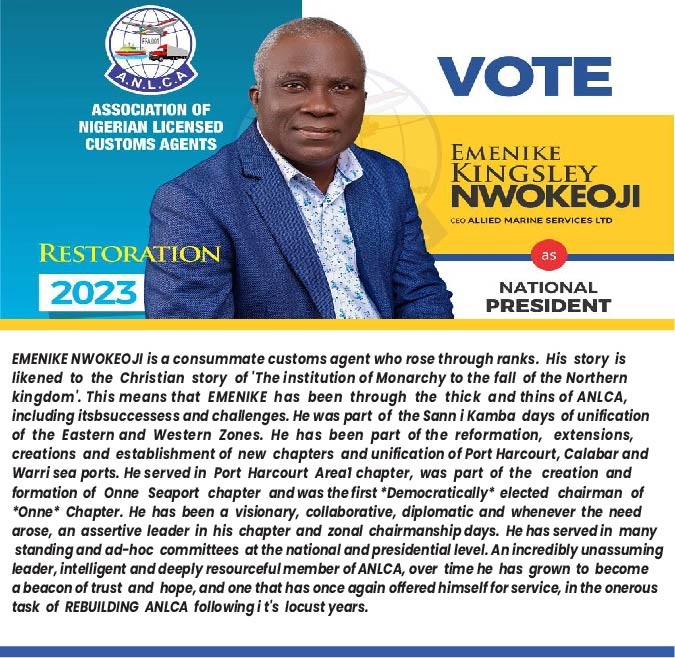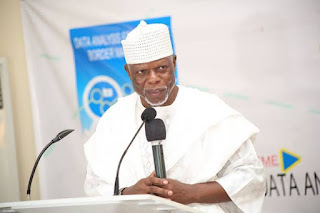Customs Strike Force: Scale of Ethnic Imbalance
Last week we looked at the recent policy somersault in the defunct Headquarters Strike Force of the Nigeria Customs Service (NCS) and identified factors that led to the tumbling, fumbling and wobbling of the failed policy erroneously conceived to strengthen the strike force.
While it is no longer news that the Comptroller General of Customs, Col. Hameed Ali (retired) ordered the dismantling of the strike force, the circumstances leading to this decision and the composition of the reconstituted but decentralized strike force, beg to draw attention must to the apparent narrow prism upon which national interests and responsibilities are distributed along ethnic consideration.
There are those who believe that this resurgence to ethnic leaning has become manifest characteristics in the President Muhammadu Buhari government, sadly supported by his cronies and close aides including unhappily, Col. Ali, who appears to be more professional, liberal and largely more patriotic in respect of plural collectivity, and in respect of national integration and ideals.
Although die hard supporters swear the customs boss harbours no such sentiment, the facts on the ground in respect to the operational leadership of the Customs Strike Force do not agree with such emotional support on the question of why no southern officer has been appointed to head this special unit since inception.
Put differently, the question on the lips of many observers is why only officers’ of northern extraction have been appointed to lead the customs strike force. Are there no competent officers of southern extraction? Are southern officers second best, second fiddle and or second class citizens that cannot be trusted with responsibilities in the customs service under the Ali repositioning and reforms agenda? Is there an agenda to scheme southern officers out of leadership position within and in the customs service?
The customs service is a family, officers don’t give credence to ethnic background, they relate as family and compatriots, and don’t have problems with position of responsibilities been distributed fairly and judiciously. They see themselves more of compatriots than northern or southern officers; and that camaraderie is gradually been fractured and destroyed under the prevailing lopsided appointments since Ali assumed leadership of the service.
This ethnic question has manifested strongly in the outcome of actions taken against customs area controllers, who were queried over particular operational decisions and similar cases. While it is beleieved in some quarter that Ali applied the sledge hammer punishment method on CACs of southern extraction, industry observers believe he has pampered those of northern extraction with a slap in the wrist, followed by protective redeployment from the area command where cases have been established against them to other area commands, considered very competitive and juicy. On the other hand, any CAC of southern extraction deemed to have been found wanting in the least unsupported operational act or involved in commission of error is immediately reassigned to Edo/Delta Command, Anambra/Enugu Command or Bauchi/Plateau Command.
That these tendencies sends wrong signals across the rank and file and create an atmosphere of distrust, envy and demoralization is to beg the question. But let us return to the politics of appointment that has so far played out in the strike force.
The defunct Strike Force had a total of four regimes, which started with the appointment of Deputy Comptroller Jalo as National Coordinator at inception. Jalo who was appointed by Alhaji Abdullahi Inde Dikko was inherited by Ali in 2015. When Ali deemed it necessary to effect leadership change, he ignored the sequence of picking from the deputy comptroller pool and appointed Comptroller Azarema in 2016.
Not long afterwards, he promoted Azarema Assistant Comptroller General, and subsequently appointed Deputy Comptroller Argungun. In 2018 he removed Argungun and replaced him with Deputy Comptroller Abdullahi Kirawa, who proved to be the most effective and efficient of all the heads of the elitists’ enforcement unit of the customs service, according to industry rating.
Instructively, all the national coordinators of the strike force, from inception to when it was collapsed, were all ‘northern officers’. It is not in doubt that 97percent of the operational results of the strike force are rooted in the south, by virtue of our national natural and economic demographics.
It is expected that after trying out four officers from a section of the country, fair play demands that appointments should have shifted to the other section of the country, the south. But rather, Ali curiously opted to kill the strike force, and thus conveniently achieve his aim of foreclosing the possibility of appointing a southern officer to the beat.
And quite sadly, was readily supported by his rubber stamp management team. Those who trust and believe in the customs boss liberal straits are said to be pointing accusing fingers at unknown enemies, arguing that Ali was pressured into dismantling the customs national strike force. Does Ali look like someone his deputies can brow beat or outwit? And just for the purpose of conceding to this argument, was it also possible that the CGC was misled into appointing only northern officers into the newly reconstituted zonal strike force, and by the way, all of whom are my friends?
Curiously, this time around, the appointment was apparently ‘zoned’ to the North East: with DC Yahaya of Zone A, from Taraba State; DC Kolobe of Zone B from Borno State, and DC Adamu of Zone C, from Gombe State. Again, there was no single officer from the south found qualified and competent to head one of the three newly established strike forces?
If these were mere administrative coincidences, then Nigeria must be a country of absurd profundities.







